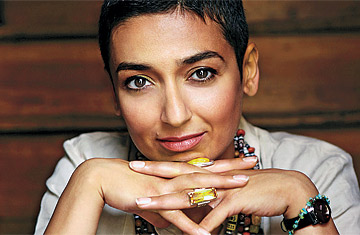
After her arranged marriage fell apart, Zainab Salbi found a cause; helping women whose lives are torn apart by war.
As Mother's Day approaches, it's worth remembering that of the more than 35 million people displaced by conflict, according to the International Rescue Committee, the vast majority are women and children. In today's wars, fighting is no longer confined to the battlefield; 90% of those killed or wounded are civilians. Often driven from their homes, women are targeted for ethnic cleansing, raped, widowed and left as the sole providers for their families in societies that, in many cases, show little respect for their rights. The most urgent tasks of rebuilding daily life in a devastated nation--feeding a family, doing the laundry, taking children to school, shopping for basic necessities--fall to women. These challenges are critical to stabilizing a society, yet the world pays more attention to military and security issues.
One woman is trying to change that. "We hear much discussion about the front lines of war," says Zainab Salbi, 38, founder of the Washington-based group Women for Women International. "We need to focus more attention on the back-line delivery of peace." Salbi's organization works to help women recover from the ravages of war and become active citizens by offering direct aid, job training, micro-credit loans, rights awareness and leadership education. Most of all, it gives women a voice. Salbi's group organizes "women's circles," which connect 20 local women in support networks, and recruits sponsors--"sisters"--around the world who correspond with the war-affected women regularly by letter.
Salbi's drive is rooted deeply in her own journey, which began as the privileged Iraqi daughter of Saddam Hussein's personal pilot. Salbi's mother believed strongly in her daughter's education and encouraged her not to assume the traditional female role in Iraqi society. "Do not become a prisoner," Salbi remembers her mother telling her over and over again. "Marry for love. Don't learn to clean and cook, because then that is all you will ever do." But when Salbi turned 20, her mother insisted that she accept a marriage proposal from an Iraqi man living in the U.S. Salbi was bewildered and furious but did as she was told. She arrived in the U.S. in 1990 and was quickly married. Just over a month later, in August, Saddam invaded Kuwait, severing Salbi's communication with her parents. But when her husband became abusive, her mother's words echoed in her heart, giving Salbi the courage to leave him and start a new life alone in a new country. Looking back, Salbi says she now understands her mother's determination to send her away. "My misfortune led to my fortune," she says.
In 1993, Salbi read about women in Bosnia's so-called rape camps--brutal military brothels--and was appalled by the slow response of the international community. "In wars, trust is lost," she says. "Betrayal leads to silence. Rape victims do not talk. Women disappear just when their families and their societies need them most--because you can't rebuild a strong economy without strong women." Raising funds through a church in the Washington area, Salbi founded Women for Women International later that year. The group has now served 153,000 women in countries such as the Democratic Republic of Congo, Rwanda, Nigeria, Afghanistan, Iraq, Bosnia, Kosovo and Sudan. It has distributed more than $42 million in direct aid and loans. More than 246,000 women in 58 countries have signed up as donors, supporters and sponsors, who exchange more than 100,000 letters a year.
Salbi's own mother-daughter story came full circle when her mother came to the U.S. in 1997 for medical treatment at the end of her life. She had lost her voice and was able to communicate only in writing--just like the women her daughter was helping. "The irony is that I had been around the world telling women to break their silence," says Salbi, "when it was really my search as well."
